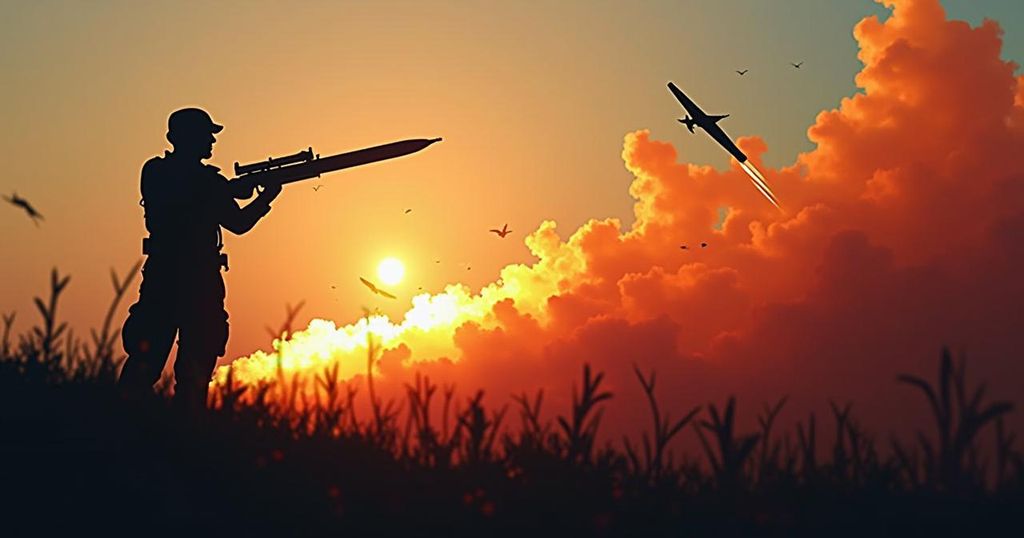Iran’s recent missile strikes on Israel escalate tensions significantly, reflecting a bold military strategy amid lost proxy confrontations. Israeli Prime Minister Netanyahu is expected to respond strongly, with implications for regional stability and his political survival. Analysts caution about the risks of overreach and the potential for escalating conflict. The situation underscores the complexity of Middle Eastern geopolitics, focusing on deterrence and military capacity.
The recent missile strikes launched by Iran against Israel are poised to significantly alter the geopolitical landscape of the Middle East. On a fateful Tuesday night, approximately 200 long-range and ballistic missiles soared across the desert, marking a drastic escalation in the ongoing conflict between the two nations. Analysts suggest that these attacks were a strategic response from Iran, prompted by a series of defeats inflicted on its proxies, particularly Hezbollah, by Israeli forces. Sanam Vakil, a Middle East expert from Chatham House, describes this situation as a precarious calculation whereby Iran seeks to restore its deterrence capabilities amid continuous Israeli attacks. These missile strikes represent a departure from previous tactics, as Iran opted for advanced ballistic weapons aimed specifically at significant military targets, including Israeli military installations and intelligence centers. However, the Iranian Foreign Minister, Abbas Araqch, emphasized that civilian areas were not the focus of these attacks, indicating a measure of restraint from Iran’s side. In the aftermath, Israeli Prime Minister Benjamin Netanyahu declared the assault a critical error on Iran’s part, vowing a robust response that could have ramifications beyond the immediate conflict. Military analysts suggest that Israel might target Iranian oil refineries, which could not only affect regional dynamics but also prompt surges in global oil prices. Furthermore, hawkish factions within Israeli leadership advocate for an even more assertive strike on Iran’s nuclear facilities, positing that this could substantially hinder Iran’s capabilities in the long term. However, experts caution that such actions could backfire, potentially accelerating Iran’s nuclear ambitions rather than curtailing them. Within Israel, Netanyahu’s approval ratings have reportedly rebounded following military successes against Hezbollah, which may influence his tactical decisions moving forward. Analysts indicate that the Prime Minister now finds himself at a crucial juncture, where the potential to reshape his legacy and national security strategy is at hand. Yet, there are concerns that his aspirations may lead to overreach, ultimately destabilizing the fragile balance of power within the region.
The context surrounding the missile strikes from Iran to Israel is grounded in the long-standing tension between the two nations, marked by a series of proxy conflicts involving various militant groups in the region. Following significant losses sustained by Iranian-supported militias such as Hezbollah in recent confrontations, Iran perceived a direct military engagement as a necessary measure to assert its influence and deterrence against Israeli operations. This backdrop is crucial for understanding the stakes involved, as the Israeli government contemplates its military and strategic responses, weighing both immediate operational goals and broader geopolitical implications.
In summary, Iran’s missile barrage on Israel signifies a critical escalation in the Middle East conflict, forcing Israeli leadership to contemplate bold responses that could reshape regional politics. The implications of these actions are multifaceted, as Israel considers targeting Iranian assets while navigating the risks of an expansive military campaign. Netanyahu’s political future hangs in the balance, with public opinion currently favoring a strong response, yet caution is warranted to avoid unintended consequences that could destabilize the region further. The coming days will be pivotal in determining the course of this conflict and its repercussions on international relations.
Original Source: www.cbc.ca






